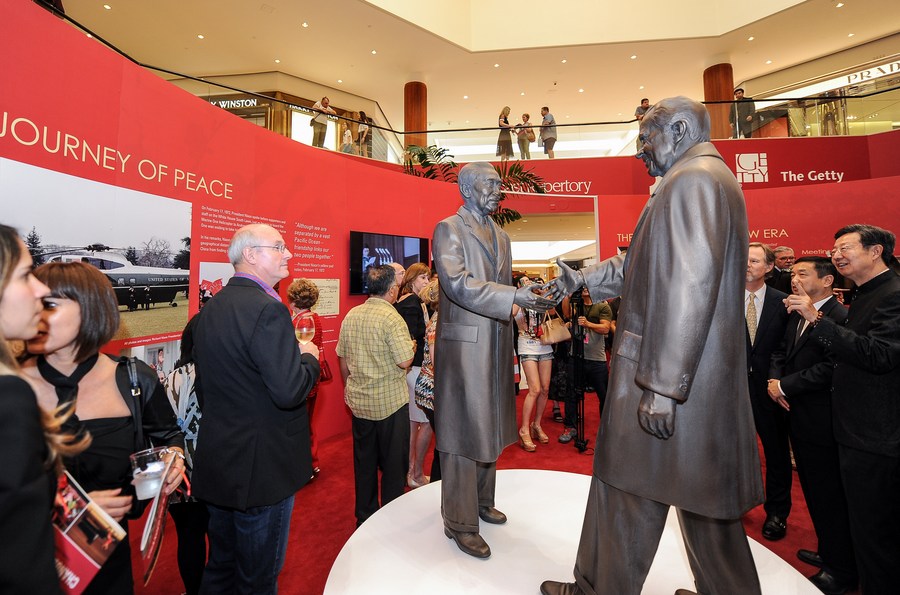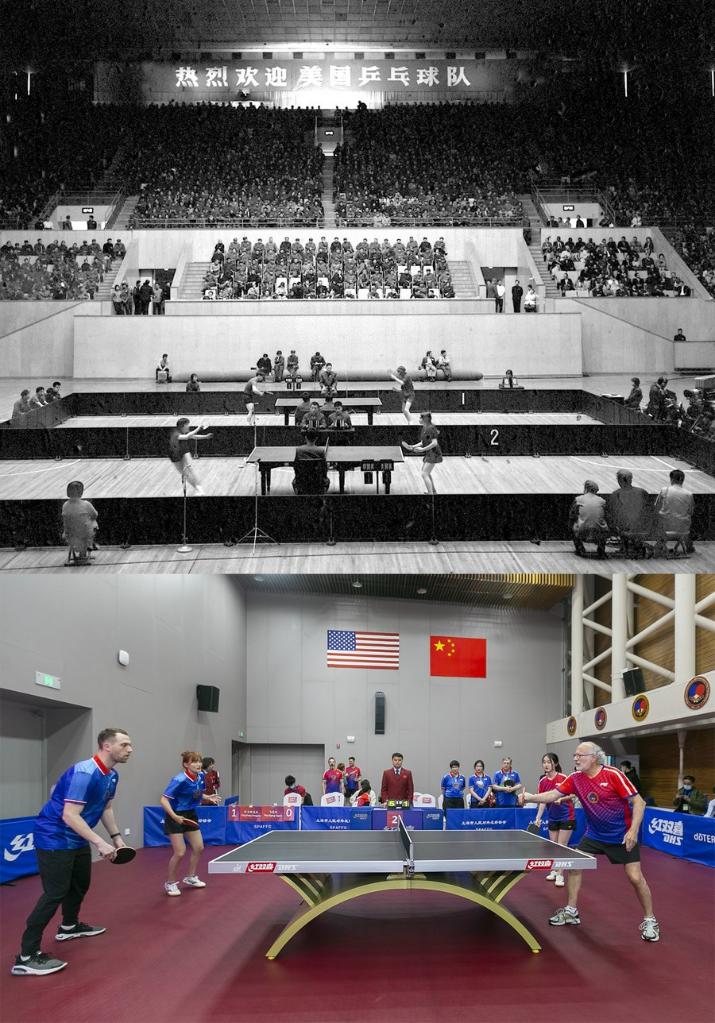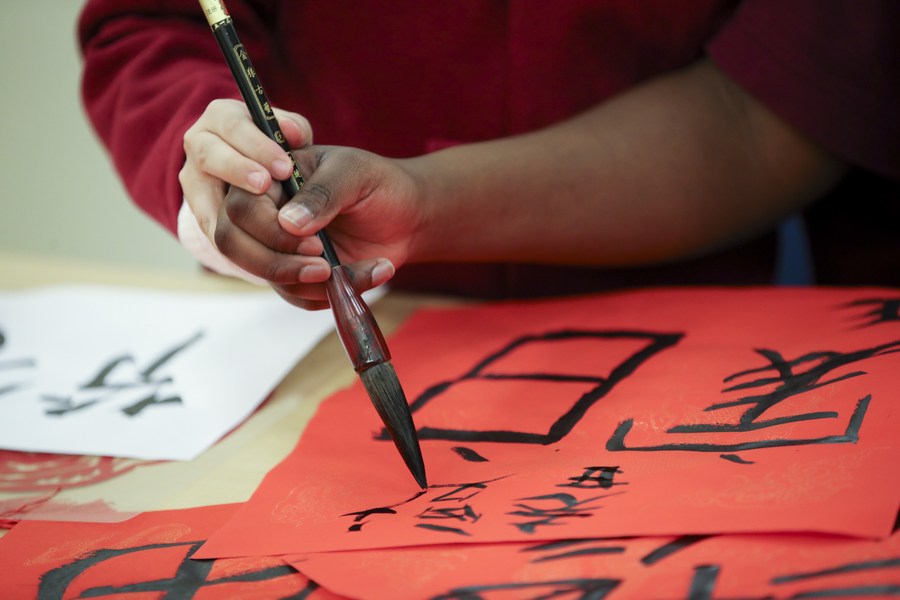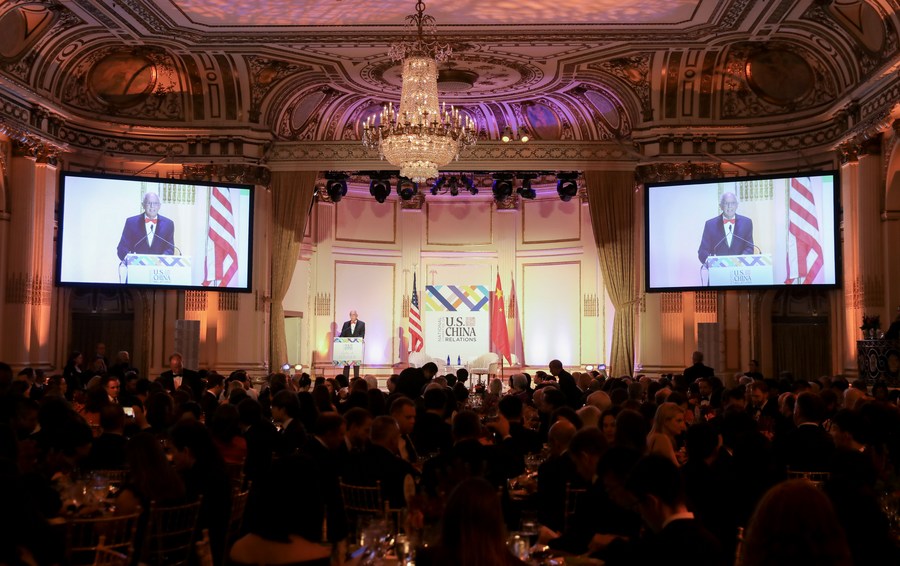
File photo shows people visiting the exhibition named "The Week That Changed the World: Nixon, China and the Arts" at South Coast Plaza in Costa Mesa, California, the United States, on June 23, 2016. (Xinhua/Zhang Chaoqun)
"We have a lot of areas where we're competing and confronting each other, but we should all be able to agree that people-to-people and student exchanges benefit both our countries and make them both stronger," said Madelyn Ross, president of U.S.-China Education Trust.
by Xinhua writers Yang Shilong, Hu Yousong
WASHINGTON, July 7 (Xinhua) -- On Aug. 17, 1979, 22-year-old Madelyn Ross arrived in Shanghai, China, without knowing what awaited her.
The fresh graduate of Princeton University was headed to teach English and take courses in Chinese literature at Fudan University, thanks to an agreement signed by the two universities.
Ross, now president of U.S.-China Education Trust, became interested in China while seeing the coverage of then U.S. President Richard Nixon's historic visit to China in 1972.
"The very fact that so little was known made China seem like a mystery. The pictures of Nixon in China looked so intriguing," Ross told Xinhua in an interview.
"The other thing was that the language looked so different and interesting. I was looking to learn a new language that would be very different from French and Spanish," she said. "Beginning in the early 70s, there had been some Ping-Pong Diplomacy and very limited exchanges of delegations, which made people like me want to find out more."
In 1975, the mystery of China and its language drew Ross to Princeton University, with its renowned East Asian Studies Department and Chinese language program. She graduated in 1979, just as it became possible for a few Americans to travel to China. She left for Shanghai eight months after Washington and Beijing officially established diplomatic relations on January 1, 1979.

Combination photo shows players of China and the United States competing in a table tennis friendly match in Beijing, capital of China, April 13, 1971 (up), and players of China and the United States competing in a friendly match to commemorate the 50th anniversary of the Ping-Pong Diplomacy between the two countries at the International Table Tennis Federation Museum in Shanghai, east China, April 10, 2021. (Xinhua)
A VERY DIFFERENT WORLD
Ross was met at the Shanghai Hongqiao airport by two professors from Fudan's foreign languages department. It was getting dark as they drove back to the university in an old Russian-made sedan.
"There were very few lights in all of Shanghai. Even the car didn't have its lights on, but when we came to an intersection, the driver flashed the lights briefly, just to make sure there were no cars or people in the road," said Ross.
"The city was very quiet. It felt like a big city awakening from a long sleep. And people were a little bit cautious about dealing with Americans. But as the year went on, you could sense a change in atmosphere. People were becoming more outgoing and friendly. It felt like an isolated world when I arrived, but things were changing quickly," she said.
"The physical transformation of China alone is extreme," said Ross, whose last visit to China was in 2019. "The streets in Shanghai and Beijing are now full of neon signs and tall buildings that didn't exist in 1979. And beneath the surface, people's lives have also been transformed. Luckily, many friendships from those early days are still intact," she said.
Ross said she misses "the sense of discovery" she experienced daily in China in 1979-80 as one of the first young Americans there.
"Anybody who goes to study abroad experiences a sense of discovery of a new place and a new culture. In my case, it was extreme because there were so few people doing what I was doing."
"And in China, there was such intense interest in meeting Americans. On both sides, there was a sense of discovery and of being pioneers who could introduce our culture to each other," she said.

This photo taken on Nov. 4, 2022 shows an evening view of the Lujiazui area in east China's Shanghai. (Xinhua/Wang Xiang)
A LOT OF PENT-UP ENERGY
After the Fudan program, Ross did a graduate degree in international affairs at Columbia University from 1980-82 and then lived and worked in Hong Kong. She moved back to the United States and worked for 10 years at the U.S.-China Business Council, where she became an editor of the China Business Review and was part of the vibrant early economic and business exchanges between the two sides.
Statistics show China-U.S. trade volume has grown from 2.5 billion U.S. dollars in 1979 to 690 billion dollars in 2022, a rise of 275 times.
"I don't think very many people predicted the pace of growth in trade and investment, because not many people realized how fast China's economy would grow," said Ross.
China's willingness to learn from outside countries, its underutilized labor force and a sense that people had an opportunity to work hard for a better life were among the factors that led to the country's economic takeoff, she said. "There was a lot of pent-up energy in China in the 1980s, 1990s, early 2000s."
On one wall of her former office at the Johns Hopkins hangs a cover from the China Business Review in 1986, illustrating a U.S.-China business meeting, showing different negotiating styles on both sides of the table.
"I accompanied many business delegations to China and witnessed so many cultural missteps and misunderstandings, so many funny banquet stories, but overall it was a very positive time. Again, there was a sense of discovery on both sides," said Ross.

Containers of China COSCO Shipping Corporation Limited are seen at the Port of Long Beach, Los Angeles County, the United States, on Feb. 27, 2019. (Xinhua/Li Ying)
A NEW GENERATION OF BRIDGE BUILDERS
Before coming to Johns Hopkins University's School of Advanced International Studies (SAIS) in 2015, Ross was director of China initiatives at George Mason University.
"For 20 years now, I've worked primarily on U.S.-China education projects. But it's the same basic task as in business and trade, of trying to help both sides understand each other and learn to work together," said Ross, who has been responsible for the Hopkins-Nanjing Center partnership and the SAIS dual degree program with Tsinghua University.
According to Ross, the Hopkins-Nanjing Center, which was the first U.S.-China joint university partnership, is a bilingual and bicultural program that celebrated its 35th anniversary in 2021.
"There are stories of senior government and business officials from the U.S. and China going to meetings where each side has a representative who went to this program," she said. "They may not always agree with each other, but because they shared this training, they know how to listen to each other, and they have the skills to work things out."
"It's important to keep training students in this way. We really need to keep education exchanges moving forward," said Ross.
She suggested both the U.S. and China should clarify that they value education exchanges. "We have a lot of areas where we're competing and confronting each other, but we should all be able to agree that people-to-people and student exchanges benefit both our countries and make them both stronger," she said.
"We need to separate the different layers of a complicated relationship and prioritize education," said Ross. She said the recent efforts to imply that these exchanges are dangerous and to sow mistrust about Chinese students in the United States are "ridiculous and counterproductive."

A student from Beijing teaches a student from Medgar Evers College Preparatory School of New York how to write Chinese calligraphy during a cultural exchange event in New York, the United States, Feb. 2, 2018. (Xinhua/Wang Ying)
A NEW WAY OF THINKING
Forty years on, Ross is still learning Chinese with a tutor. "I try to keep up the language at least a little. When you read articles in the original Chinese, you understand things in a different way than when you read the translation."
Besides, "It's fun," she said. "It's so rich, the characters and the history and tradition of the language."
Ross believes language learning is fundamental. "When we learn a new language, we learn a new way of thinking."
"In a globalized world, you have to understand that other countries don't always think the way we do. The most vivid way to learn that is to learn how to communicate in another language," she said.
If she could start over, Ross said she would "absolutely" choose to study Chinese and return to China. "For me, there are many different Chinas and many different things to explore," she said.
"I miss the same things in China that I miss here -- sitting down with people that I care about and just talking and eating, being together in the same physical space, all the things that the pandemic has cut off," she said.
Ross has a deep appreciation for the diverse cuisines of China, which vary widely and offer an abundance of unique dining experiences.
"My favorite Chinese food is from Shandong. I absolutely love Shandong breads and noodles," she said. The city of Qingdao in east China's Shandong Province was one of the first places she visited in 1979. She has since spent time in Weihai, another Shandong city, at a branch campus of Shandong University, a partner of George Mason University.

Photo taken on Oct. 26, 2022 shows the annual Gala Dinner of the National Committee on U.S.-China Relations (NCUSCR) in New York, the United States. (Xinhua/Wang Ying)
A RENEWED UNDERSTANDING OF U.S.-CHINA TIES
Ross is optimistic that the strained relationship between the United States and China will resume its normal course in the near future.
"The last four years were very difficult, but we learned some things. One thing we learned is you can do a lot of damage in a short time to the relationships between countries," she said.
"There's a renewed realization that bilateral relationships are fragile," she said. "For a long time, we took it for granted that people-to-people exchanges were strong and they would continue, but the combination of the pandemic and the rising political tension has slowed them to a trickle."
The two largest economies in the world are also two complicated nations, Ross said.
Still, she sees a way forward.
"As long as we keep working on the basics of communicating, listening, and trying to understand each other's perspective, most of the time we will be able to work something out and find a compromise," she said.
Grassroots exchanges of students and scholars are a "really good place for the two sides to start rebuilding trust," she said.
In late March, Ross took part in a webinar with education leaders from China and the United States, and both sides affirmed that they wanted to get back to having more exchanges as soon as possible.
"We need to learn how to preserve the world's resources, and fight pandemics, and improve our climate. We're not going to solve these problems by turning our backs on each other. That will make the world a much more dangerous place. So let's do the hard work, roll up our sleeves, and not decouple just because we disagree," she said. ■












